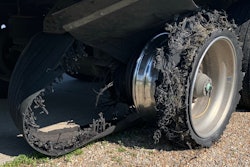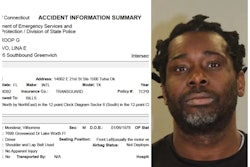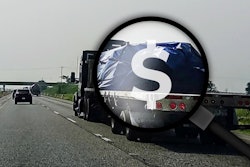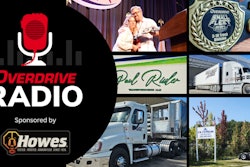With freight fraud running rampant and costing truckers and brokers an estimated $800 million a year, and loose demand in the spot market, brokers can afford to get picky with strict carrier selection criteria.
These days, it might not matter if your authority is five or more years old, if you've hauled for a particular broker dozens of times before, if you're TSA-certified to run in and out of airports, even if a major trade publication features a story detailing your real-life, non fraudulent trucking operation -- a broker still might drop you for something as arbitrary as lack of roadside inspections on your two-year record in the federal system.
Take Candace Marley, Overdrive's March Trucker of The Month. A Google search of her name and business turns up a profile of Marley's operation complete with pictures. She's had her CDL since 2009 and her authority since 2022.
But still, brokers circling the wagon and stiffening carrier-vetting protocols won't give her a load. A few weeks ago, she deactivated her authority and leased on to Mercer.
"It’s gotten harder and harder and harder," she said.
Marley was doing good business hauling loads brokered by WorldWide Logistics, out of Des Moines, Iowa. Until they slammed the door in her face.
"I loved hauling for those guys," she said. "I hauled for those guys when I was leased on to Future Trucking [out of Williamsburg, Iowa], and when I first got my own authority I reached out and they said, 'Oh yeah, you've hauled for us before and we've never had a problem with you.' They were happy to bring me in."
Then something changed at WorldWide. Over the subsequent period, freight fraud of all types likely doubled, including double brokering. Some brokers have long viewed the existence of inspections in a carrier's history as evidence they are an actual trucking company -- and not an entity registered solely for the purpose of double brokering. The idea has since spread like wildfire among brokerages.
 Owner-operator Candace Marley was Overdrive's Trucker of the Month for March 2024. Owner-operators can enter the Trucker of the Year competition through October at this link.
Owner-operator Candace Marley was Overdrive's Trucker of the Month for March 2024. Owner-operators can enter the Trucker of the Year competition through October at this link.
Marley tried going to the scale house nearby in Illinois, but "they will not give you a voluntary inspection," she said. "They said it defeats the purpose." In her native Iowa, "the scales are always closed when I go by."
Though it's increasingly uncommon, some truckers have had luck asking for inspections. One lucky truck racked up 15 inspections in three months in South Carolina, but Marley, like many other owners, simply sees a raw deal at the scales and the way brokers are treating roadside inspections.
The loss of her major source of freight threw her back to the load boards, exactly where she didn't want to be at a time of low rates and high competition. "Pretty much I was stuck working with nothing but RXO and CH Robinson," she said. "Everyone was going for this whole inspection thing. Everywhere I turned, it was 'sorry, you got to have an inspection.'"
Marley lists Knight-Swift, WorldWide Logistics, USA Truck (now D.B. Schenker) and Loadsmart as some of the brokers that cut her out over the simple fact she hasn't been inspected at roadside. "It blows my mind that I got booted from people that I had hauled loads for before," she said.
Hey, brokers: Roadside inspections are random, not required
Owner-operator William McKelvie has a similarly high profile as far as owner-operators go, having spoken with former FMCSA administrator Robin Hutcheson and even President Joe Biden in person about trucking issues. But to some brokers, he remains just another number trying to access freight.
[Related: Yes, double brokers can get inspections -- Here's proof]
When McKelvie recently filled out a broker packet, he got denied because he didn't have any inspections on his authority. "As we all know there are two basic types of DOT inspections. One is required, and one is not," he said. The records that brokers are accessing within FMCSA's systems or through third-party data miners are "the ones that are not required."
But what about the proof of periodic inspection that every truck on the road must maintain? Outside of the owner's inspection certification on the truck itself, there is no public "record of the periodic annual inspection for anyone to see," McKelvie noted, "nor is there any accounting of such." If truckers don't get chosen for the non-required inspection at the roadside or a scale house, to any party examining the public record for the carrier it looks like they've never had an inspection.
McKelvie has a point. The Federal Motor Carrier Safety Administration itself warns against reading too much into data housed in federal systems about motor carriers. From FMCSA directly about use of their CSA Safety Measurement System, basis for the inspection accounting in the Safer carrier-lookup portal as well:
Readers should not draw conclusions about a carrier's overall safety condition simply based on the data displayed in this system. Unless a motor carrier has received an UNSATISFACTORY safety rating under part 385 of title 49, Code of Federal Regulations, or has otherwise been ordered to discontinue operations by the Federal Motor Carrier Safety Administration, it is authorized to operate on the Nation's roadways.
But of course brokers -- and insurance companies and shippers and many others -- do draw conclusions about a carrier based on SMS scores and other incomplete, sometimes inaccurate publicly available data. Sometimes they use the criteria in an in-house process, and other times, a third-party service in the blossoming "carrier compliance industry" resells them the data.
[Related: Big change for Carrier Assure? Vetting tool acknowledges shortcomings]
Recall the cargo van carrier that took issue with Carrier Assure's grading system, which gave the small fleet an "F" score for not getting any inspections. Many such vans don't ever cross a scale, and aren't required to. Following our reporting on Carrier Assure, the service clarified that it should not be used to grade specialized operations like expedited cargo van fleets, and eventually at least one of the carriers in question did get access to freight they'd been cut out of.
McKelvie and other impacted owner-ops think more needs to be done.
"There needs to be an educational campaign to the brokerages," McKelvie said. More need to fully understand, with regard to inspections, just "what is required, and what is random."
Even more important, he added: Not having any random roadside inspections should "not disqualify, and is not a justified reason to disqualify, any motor carrier from hauling their freight." In his case, he noted, his two most recent inspections were of the unfinished variety. That is, the inspector never filed paperwork for a full clean inspection after not finding anything wrong with a cursory look, a common issue made ever more problematic by brokers' faulty assumptions about roadside inspections.
Public accounting around McKelvie's authority in Safer and the CSA SMS makes it look like he's never been inspected at all.
Brokers are making other faulty assumptions, too
Owner-operator Sean Clear had a snafu with his insurance payment, accidentally sending a check to the wrong address and not getting a prompt nonpayment notification from his insurer. His insurance lapsed and his authority was briefly revoked before being reinstated. That now shows in the public record.
"I call on loads all the time and they’re saying my authority is only three months old," he said. "No, my authority is seven years old." The mix up with his insurance payment makes it appear otherwise for brokers who don't bother to dig into the authority history.
Transportation Intermediaries Association CEO Anne Reinke recently described the current environment in the strongest possible terms as a "fraud apocalypse," tacitly admitting that the brokers hadn't exactly cracked how to keep the crooks out of their networks. Load boards and big brokerages and other other freight platforms can't really handle vetting 800,000 or so registered entities in FMCSA's database, nor the relentless hacking attempts from thieves.
[Related: 'Iluminati' hack hits DAT boards with thousands of $20/mile postings]
Instead, it seems easier to paint with a broad brush and throw a baby out with the bathwater now and again. Dozens of carriers report not being able to find work despite having legitimate operations. Double brokering, identity theft, and actual cargo theft as a result, of course, continue roughly apace.

How do owner-operators and small fleets survive and thrive in tough economic times?Find out in this webinar.
Join us for a live webinar Aug. 22 at 1 p.m. CT and hear from owner-operators and small fleets as we discuss how they prepared during the good times to weather the storms.
Owner-operator Candace Marley said she'd seen firsthand Facebook groups where fraudsters buy and sell older MC numbers that pass muster at big brokers. "I could have sold mine, but it didn't have any inspections on it," she said, also noting the moral and ethical reasons not to deal with the fraudsters.
"So what we have here, folks, is a pretty big disconnect with the brokerages, and their not knowing how this system works, what Safer shows and does not show, and how to properly rate a motor carrier," concluded McKelvie.
TIA, the Owner-Operator Independent Drivers Association, the American Trucking Associations and other trucking organizations have rallied behind a piece of legislation that would explicitly empower FMCSA to fine bad actors in the system $10,000 for things like using a fake principal place of business or not disclosing relationships between brokerage and carrier entities.
FMCSA's own reasoning behind not enforcing $10,000 fines on these matters may or may not make sense, but rather than argue with them, top industry players have urged an act of Congress to shore things up. FMCSA itself, just this month, went so far as to issue a report to Congress essentially pleading with them for more authority to combat the problems.
Perhaps Congress will listen to the voices of small business truckers and their industry partners, but Reinke expressed doubt the bill would go anywhere during an election year.
For now, independents, hold onto that authority. Keep the insurance current, and if the scale house light is flashing, maybe go slap on some paper numbers or try to draw some other attention to yourself.
Future business could depend on it.
[Related: Norman Camamile's weekend with the 'Iluminati' hacker: Four Amazon runs, no payment]











